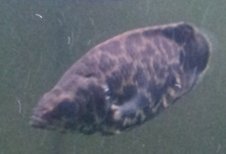Leopard Bush Fish
(Ctenopoma Acutirostre)
Alternate Names:
African Spotted Leaf Fish
Leopard Ctenopoma
Spotted Climbing Perch
African Leaf Fish
 Leopard Bush Fish (Ctenopoma Acutirostre) |
Size: Can grow to 6 inches Temp Range: 73°F to 82°F pH Level: 6.0 to 8.0 Lifespan: 5-8 years Tank Size: 20 gal. Diet: Pellets, Frozen, Live Difficulty: Easy to Moderate |
Geographic History
This little wet friend hails from the Congo River Basin and prefers to make its home in slow moving streams and water filled ditches. Their home habitat is a major river system in Central Africa and is surrounded by dense jungle.
Enviornment
Leopard Bush Fish are middle and top level aquarium swimmers during the active parts of their day. During their periods of inactivity, they prefer to hide among aquatic plants or in caves. They will establish territory over their micro-habitat in caves or thick plant roots. They also prefer low light levels.
Compatibility
Be careful of putting small, guppy sized fish in the water with these fish. They tend to eat anything that will fit into their mouth. They will also become aggressive and territorial with other Leopard Bush Fish as well as fish with their general body shape and size. This is especially true in male to male encounters. During feeding, Leopard Bush Fish can be at odds with cichlids and caution should be taken if the cichlid is the larger fish.
Sexing
Males have more pronounced spines on their gill covers than females.
Behavior
These fish are most active at twilight. They are aggressive feeders and will usually outsmart other fish with a "hit 'em where they ain't" strategy of seeking food away from the main body of feeding fish.
They have an interesting feeding behavior versus live food. Remaining still, this fish will curl its tail in toward its head, mimicing a drifting leaf. When the unsuspecting live food swims by, the Leapard Bush Fish will suck them in and swallow them whole.
This is an intelligent and inquisitive fish. Although aggressive in their micro-habitats, away from those areas they seem to be rather peaceful. They are also very graceful slow swimmers, riding the current while gently steering themselves to stay with it. When they feel the need to move out, Leopard Bush Fish can be very quick.
Sometimes they will surface and gulp air, similar to gourami. They are labyrinth fish but seem to rely less on that organ than gill breathing.
My Leopard Bush Fish will chase other fish his size or smaller if they agitate him or try to steal his food. He has claimed a decorative tree stump as his micro-habitat territory and will aggress any fish that invades his space. His favorite daytime activity seems to be approaching the front glass of the aquarium and watching what is going on outside of his little world. He is the first fish to the top during feeding and will eat cichlid sticks directly from my fingers.
Breeding
Breeding Leopard Bush Fish tends to be kind of tedious. You will need a larger tank, 30 or more gallons, with a tightly fitting hood and floating plants. The tight hood is to create a humidity layer between the water and lights. The fry will need this to develop their labyrinth organ.
Breeding pairs embrace in the water. The female ejects her eggs, numbering in the many thousands, and the male delivers sperm as they float away to the top. The eggs then lodge in the floating plants and will hatch fry in about 48 hours. The fry begin free swimming shortly thereafter.
They should be fed infusoria for 2 days and then switched over to brine shrimp nauplii. There is a very low survival rate of the fry, possibly due to cannibalism.
The onset of spawning does not seem to be very well understood. Apparently, spawning is seasonal and can last for several months, although why this happens is unclear. These fish may not become sexually active until almost five years old.
For more detailed information, go to Wikipedia's Leopard Bush Fish page.





